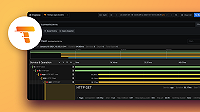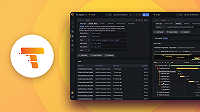This is documentation for the next version of Grafana Tempo documentation. For the latest stable release, go to the latest version.
Multitenancy support
Multitenancy is supported in the metrics-generator through the use of environment variables and per-tenant overrides. This is useful when you want to propagate the multitenancy to the metrics backend, keeping the data separated and secure.
Requirements
- Tempo version 2.4.0 or later
Usage
To use this feature, you need to define the remote_write_headers override for each tenant in your configuration.
You can also use environment variables in your configuration file, which will be expanded at runtime.
To make use of environment variables, you need to pass the --config.expand-env flag to Tempo.
Example:
overrides:
team-traces-a:
metrics_generator:
processors: [ 'span-metrics' ]
remote_write_headers:
Authorization: ${PROM_A_BASIC_AUTH}
team-traces-b:
metrics_generator:
processors: [ 'span-metrics', 'service-graphs' ]
remote_write_headers:
Authorization: ${PROM_B_BEARER_AUTH}export PROM_A_BASIC_AUTH="Basic $(echo "team-a:$(cat /token-prometheus-a)"|base64|tr -d '[:space:]')"
export PROM_B_BEARER_AUTH="Bearer $(cat /token-prometheus-b)"In this example, PROM_A_BASIC_AUTH and PROM_B_BEARER_AUTH are environment variables that contain the respective tenants’ authorization tokens.
The remote_write_headers override is used to specify the Authorization header for each tenant.
The Authorization header is used to authenticate the remote write request to the Prometheus remote write endpoint.


